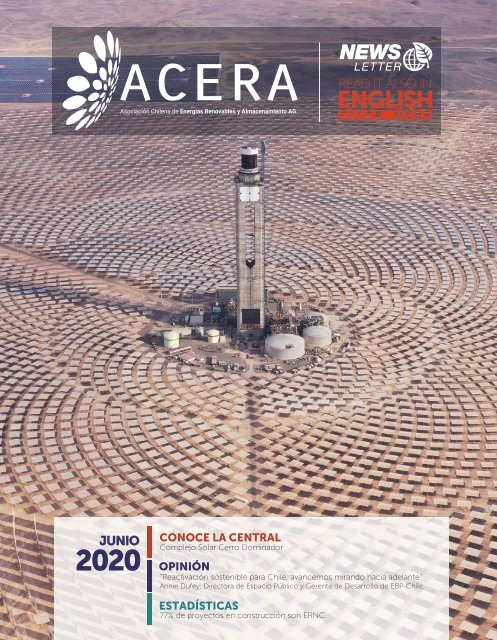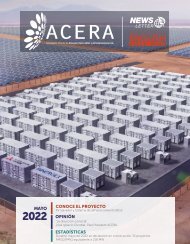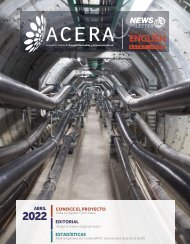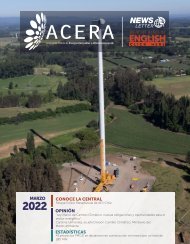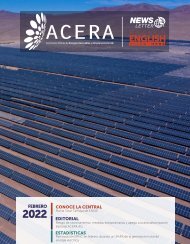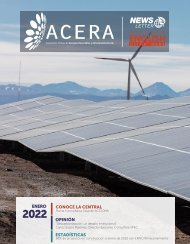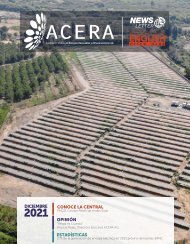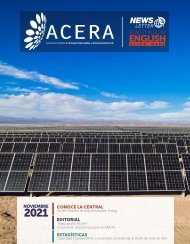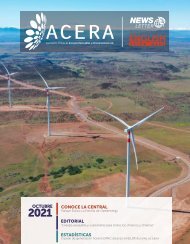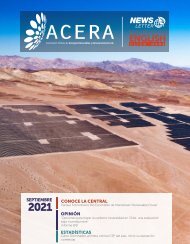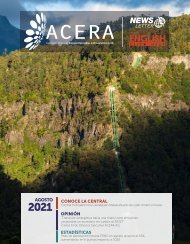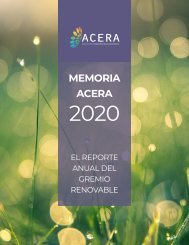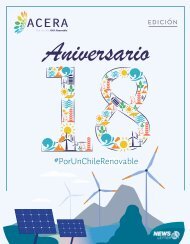Newsletter ACERA - Junio 2020
You also want an ePaper? Increase the reach of your titles
YUMPU automatically turns print PDFs into web optimized ePapers that Google loves.
READ IT ALSO IN<br />
ENGLISH<br />
JUNIO<br />
CONOCE LA CENTRAL<br />
Complejo Solar Cerro Dominador<br />
<strong>2020</strong> OPINIÓN<br />
“Reactivación sostenible para Chile, avancemos mirando hacia adelante”<br />
Annie Dufey, Directora de Espacio Público y Gerente de Desarrollo de EBP-Chile.<br />
ESTADÍSTICAS<br />
77% de proyectos en construcción son ERNC
CONOCE<br />
la central<br />
COMPLEJO SOLAR<br />
CERRO DOMINADOR<br />
Tecnología: CSP en construcción, más FV en operación<br />
comercial.<br />
Empresa Socia de <strong>ACERA</strong>: Cerro Dominador<br />
Potencia Instalada: 210 MW<br />
Región: Antofagasta<br />
Sistema al que inyecta: Sistema Eléctrico Nacional<br />
En <strong>2020</strong> el complejo solar Cerro Dominador finalizó dos nuevos<br />
y relevantes hitos: el izado del receptor y se completó el<br />
proceso de fundición de sales. La primera, fue una maniobra de<br />
ingeniería única en el mundo, subiendo el receptor por el<br />
interior de la torre de 220 metros de altura. En el caso de la<br />
fusión de sales fueron 46 mil toneladas de sales provenientes del<br />
desierto de Atacama. Es este sistema de almacenamiento<br />
térmico por sales el que permite a la planta termosolar producir<br />
energía 24/7.<br />
El complejo Cerro Dominador combina una planta fotovoltaica<br />
(100 MW) y una de concentración solar de potencia (110MW), la<br />
primera de este tipo en América Latina.
ÍN<br />
04.<br />
OPINIÓN<br />
“Reactivación sostenible para Chile, avancemos mirando hacia adelante”<br />
Annie Dufey, Directora de Espacio Público y Gerente de Desarrollo de EBP-Chile.<br />
DI<br />
CE<br />
05.<br />
NOTICIAS<br />
-<br />
-<br />
-<br />
-<br />
<strong>ACERA</strong> tiene nuevo Ciclo de Webinars: Pobreza Energética fue el<br />
punto de partida<br />
Corredores Sustentables: El próximo paso en líneas de transmisión<br />
en Chile<br />
Estrategia Nacional de Hidrógeno Verde: Comienzan las mesas<br />
técnicas<br />
Avanza la Hoja de Ruta de Economía Circular<br />
08.<br />
10.<br />
NUEVOS SOCIOS<br />
Enersa<br />
Grupo Energy Lancuyen<br />
Hanwha Q CELLS Chile SpA<br />
TE Mobility SpA<br />
ESTADÍSTICAS<br />
77% de proyectos en construcción son ERNC<br />
11.<br />
CONOCE A NUESTROS SOCIOS<br />
Atlantica<br />
Safira Energía Chile<br />
13.<br />
COMITÉS TÉCNICOS<br />
14.<br />
EVENTO DESTACADO <strong>ACERA</strong><br />
<strong>ACERA</strong> realiza su #CenaRenovable en formato virtual<br />
16.<br />
EVENTOS<br />
18.<br />
READ IT ALSO IN ENGLISH
04.<br />
REACTIVACIÓN SOSTENIBLE PARA CHILE,<br />
AVANCEMOS MIRANDO HACIA ADELANTE<br />
Enfrentamos la crisis sanitaria más grande de la historia reciente, arrancando<br />
vidas y poniendo al límite el sistema de salud. Esta compleja situación se da<br />
en un contexto donde los impactos del cambio climático ya afectan a los<br />
ecosistemas, medios de subsistencia y especialmente a los más pobres y<br />
vulnerables. A las crisis sanitaria y climática, en Chile se añade la crisis social<br />
que estalló en octubre de 2019, que evidencia la inequidad y disconformidad<br />
de nuestra sociedad, la cual está lejos de ser resuelta y la pandemia sólo<br />
la profundizará.<br />
O<br />
PI<br />
NIÓN<br />
Annie<br />
Dufey<br />
Directora de Espacio<br />
Público y Gerente de<br />
Desarrollo de EBP-<br />
Chile.<br />
En este contexto, hace unas semanas, un grupo transversal de personas<br />
hizo el llamado a una #ReativaciónSostenible, que convoca a superar la<br />
pandemia construyendo juntos un país más sostenible y resiliente, alertando<br />
sobre la necesidad de impulsar la recuperación económica post-pandemia<br />
alineada con los compromisos climáticos adquiridos por Chile bajo el<br />
Acuerdo de París. En pocos días, el llamado había adherido 615 instituciones<br />
entre academia, empresas, organizaciones sindicales, gremiales y redes<br />
institucionales, ONGs, centros de estudio, asociaciones de alcaldías y juntas<br />
de vecinos, y unos 1.700 actores de la escena nacional, entre ellos <strong>ACERA</strong>.<br />
Al mismo tiempo, se hizo público el acuerdo nacional sobre el Plan Económico<br />
de Emergencia, que establece el marco fiscal para abordar los impactos<br />
de la crisis sanitaria, destinando US$12.000 millones en un periodo de<br />
dos años. Qué duda cabe de lo urgente que es hacer llegar en forma inmediata<br />
un piso mínimo de ingreso para las familias más vulnerables y a las<br />
pequeñas empresas, por lo que el acuerdo es una gran noticia.<br />
El Plan también se pronuncia sobre la reactivación económica apoyando la<br />
inversión con énfasis verde y la mitigación del cambio climático. Lo cierto<br />
es que las medidas ahí mencionadas, básicamente grandes obras de infraestructura,<br />
distan bastante de constituir un paquete de reactivación resiliente,<br />
alineado con los esfuerzos climáticos requeridos por la ciencia y la transformación<br />
requerida para que Chile pueda entrar de lleno al Siglo XXI.<br />
Medidas de triple ganancia -económica, ambiental y social -, alineadas con<br />
el Acuerdo de París y rápidamente implementables, son las que deben ser<br />
incentivadas. El reacondicionamiento térmico de viviendas de familias<br />
vulnerables no sólo aborda la contaminación del aire reduciendo las necesidades<br />
de calefacción de las familias, sino que también mejora la calidad de<br />
vida y genera rápidamente empleo local a lo largo del país. Instrumentos<br />
financieros para dar liquidez a empresas de servicios energéticos también<br />
apuntarían en esa dirección. Instrumentos tributarios para corregir externalidades<br />
aprovechando la baja en el precio del petróleo además aliviarían el<br />
déficit fiscal. En el mediano plazo, el desarrollo de nuevos mercados de<br />
energías limpias, como es el hidrógeno verde, permitirá a Chile convertirse<br />
en un referente global atrayendo inversiones, generando empleo de calidad<br />
y, de paso, viabilizando una minería verde, pero las señales claras para que<br />
ello ocurra deben darse hoy.<br />
Dada la magnitud de los recursos involucrados en el Plan Económico, la<br />
oportunidad para impulsar las transformaciones que el país necesita es<br />
única. Como dice #ReativaciónSostenible, “el diseño e implementación de<br />
las medidas de reactivación determinará el desarrollo de nuestra economía<br />
y sociedad en el corto y largo plazo, por lo que hay que invertir los recursos<br />
de forma que sean una fuente de bienestar y prosperidad y evitar que sean<br />
una carga para las próximas generaciones”. Si construimos mirando hacia<br />
atrás, esa será la dirección que tomará la recuperación.
05.<br />
NO<br />
TI<br />
CIAS<br />
Con la intención de cumplir un rol informativo y abrir el debate de los<br />
temas relevantes de la industria, <strong>ACERA</strong> ha desarrollado un nuevo Ciclo de<br />
Webinars que comenzó con el evento “Pobreza Energética: Una realidad<br />
y desafío que ha hecho evidente la crisis sanitaria”, el cual contó con una<br />
presentación del Oficial de Asuntos Económicos de la División de<br />
Recursos Naturales de la CEPAL, Rubén Contreras, quien se refirió al<br />
escenario latinoamericano y cómo la pandemia ha impactado en los<br />
índices de pobreza.<br />
El conversatorio que siguió a la presentación central contó con la<br />
participación del Alcalde de la I. Municipalidad de Renca, Claudio Castro, el<br />
Líder del Programa Inclusión Energética, Rubén Méndez, la Gerente del<br />
Instituto Forestal de Los Ríos, Alejandra Schueftan, y la Coordinadora de la<br />
Red de Pobreza Energética, Anahí Urquiza. Además de la moderación de la<br />
Consejera de <strong>ACERA</strong> y Gerente de Sostenibilidad de Consorcio Eólico,<br />
Carola Venegas, quien comentó que “esta iniciativa nos permite visibilizar<br />
el gran concepto de pobreza energética, que abarca elementos que se<br />
cree tienen amplia cobertura y están resueltos. Estos problemas requieren<br />
un abordaje desde lo público, pero también la tecnología y las energías<br />
renovables pueden tener un rol fundamental en cerrar estas brechas”.<br />
Con esta iniciativa, que cuenta con la colaboración de Marca Chile, <strong>ACERA</strong><br />
busca ser un aporte en mantener vigentes materias relevantes de la nueva<br />
realidad que enfrenta la industria, de manera de fomentar con más fuerza<br />
los temas renovables, de cambio climático y pobreza energética, que<br />
toman tanta importancia durante la crisis sanitaria mundial.<br />
REVIVE EL WEBINAR COMPLETO ACÁ<br />
<strong>ACERA</strong> tiene nuevo Ciclo<br />
de Webinars:<br />
Pobreza Energética fue el<br />
punto de partida
Corredores Sustentables:<br />
El próximo paso en líneas de<br />
transmisión en Chile<br />
El Consejo para la Defensa de Recursos Naturales (NRDC por sus<br />
siglas en inglés) y <strong>ACERA</strong> realizaron el webinar “El próximo paso en<br />
líneas de transmisión en Chile”, con el objetivo de dar a conocer<br />
experiencias exitosas internacionales de manejo integrado de<br />
vegetación en líneas de transmisión, para promover su<br />
implementación en Chile y en la Región.<br />
Una piedra angular del plan de Chile para lograr la salida de las<br />
centrales a carbón al año 2040 es el desarrollo significativo de<br />
centrales ERNC, lo que requerirá, a la vez, líneas de transmisión<br />
adicionales para transportar esa energía limpia a los centros de<br />
consumo. Carlos Finat, Director Ejecutivo de <strong>ACERA</strong>, señaló al<br />
respecto que “las nuevas líneas que se construyan o sus<br />
ampliaciones van a tener que salvar barreras más exigentes para<br />
lograr su licencia social, en el evento vimos una valiosa experiencia<br />
que muestra que perfectamente se puede combinar el desarrollo<br />
sustentable con la construcción de un sistema de transmisión<br />
adecuado para las necesidades de nuestro país”, comentó el<br />
también moderador del evento.<br />
La relación entre <strong>ACERA</strong> y NRDC se ha mantenido activa hace varios<br />
años, apoyando e impulsando los análisis de la ONG que podrían<br />
tener buenos resultados en Chile. Se espera sigan generando<br />
iniciativas conjuntas que aporten a la sustentabilidad del país y el<br />
planeta.<br />
REVIVE EL WEBINAR COMPLETO ACÁ<br />
Paula Bustos<br />
paula.bustos@acera.cl<br />
+569 92009825
07.<br />
Estrategia Nacional de Hidrógeno Verde:<br />
Comienzan las mesas técnicas<br />
El Ministerio de Energía anunció el inicio de las mesas técnicas para el<br />
desarrollo de la Estrategia Nacional de Hidrógeno Verde que permitirá<br />
posicionar a Chile como un país líder en el desarrollo de esta<br />
industria.<br />
65 instituciones son las que están participando de las mesas técnicas,<br />
entre las cuales se encuentra <strong>ACERA</strong>, representada por su Director<br />
Ejecutivo, Carlos Finat, y su Director de Estudios e Ingeniero de<br />
Estudios, Darío Morales y Felipe Gallardo, respectivamente, además<br />
de empresas e instituciones académicas, todas convocadas por el<br />
Ministerio de Energía para que entreguen su visión, complementen el<br />
diagnóstico de brechas y contribuyan en la definición de las acciones<br />
necesarias para que Chile pueda desarrollar plenamente la industria<br />
del hidrógeno verde.<br />
Se estima que el hidrógeno verde sea un elemento clave en el<br />
desarrollo económico del país habilitando la diversificación<br />
productiva, la creación de empleos, y polos de inversión en regiones.<br />
Adicionalmente, se espera que los costos de producción en Chile<br />
bajen significativamente al 2030, principalmente por reducción en los<br />
costos de inversión. En este contexto, Chile tiene la oportunidad de<br />
posicionarse como un líder internacional en hidrógeno verde.<br />
Fuente: Ministerio de Energía<br />
Avanza la Hoja de Ruta de<br />
Economía Circular<br />
Con la intención de impulsar una transición hacia el “Chile Circular”<br />
del futuro, que termine con la cultura de lo desechable, está<br />
trabajando el Comité Estratégico para la elaboración de una Hoja de<br />
Ruta de Economía Circular, la cual está estructurada en cuatro<br />
grandes pilares, cada uno con metas y objetivos concretos, de corto,<br />
mediano y largo plazo: Obtención de materias primas; Producción;<br />
Consumo y servicios; y Gestión de residuos.<br />
Sector público, municipalidades, sociedad civil, academia, sector<br />
privado y expertos fueron los convocados al Comité Estratégico, del<br />
cual forma parte <strong>ACERA</strong>, representado por su Director de Estudios,<br />
Darío Morales y Directora de Comunicaciones, Fernanda Varela.<br />
Morales destaca la importancia de esta iniciativa y el rol de las<br />
renovables comentando que “la energía tiene enorme impacto en la<br />
huella ambiental de todos los sectores económicos de un país. Como<br />
consecuencia de lo anterior, no cabe duda de que las energías<br />
renovables deberán cumplir un rol fundamental en el cambio de<br />
paradigma desde una economía extractiva lineal a una economía<br />
circular, que minimice tanto la extracción de recursos naturales como<br />
la generación de residuos”.<br />
El comité estratégico se centrará en trabajar durante las fases de<br />
definición de la visión y diseño de la Hoja de Ruta, participando<br />
activamente en los talleres que se realizarán en estas fases, y sirviendo<br />
en el rol de validación de los resultados que se obtengan. Una de las<br />
propuestas es que al 2040 el 10% de residuos domiciliarios, como<br />
máximo, sean enviados a un relleno sanitario (hoy es un 96%),<br />
mientras que se reciclen, al menos, el 65% de los residuos<br />
domiciliarios generados en el país.<br />
Fuente: Ministerio del Medio Ambiente
08.<br />
REVISA MÁS<br />
ESTADÍSTICAS AQUÍ<br />
ESTA<br />
DÍS<br />
TICAS<br />
Tecnología<br />
ERNC<br />
Energía<br />
GWh<br />
Energía<br />
%<br />
<strong>Junio</strong> <strong>2020</strong><br />
Variación<br />
mes<br />
anterior<br />
Variación<br />
año<br />
anterior<br />
<strong>2020</strong><br />
YTD<br />
1.166 18,2% 2,8% 2,4% 19,2%<br />
GENERACIÓN DE ENERGÍA<br />
ELÉCTRICA SEN<br />
6.411 GWh<br />
Total de energía eléctrica generada<br />
18,2%<br />
Energía ERNC<br />
15,8%<br />
Hidráulica convencional<br />
66%<br />
Termoelectricidad<br />
La participación ERNC en junio<br />
de <strong>2020</strong> corresponde al 18,2%<br />
del total de la energía generada.<br />
Biogás<br />
Biomasa<br />
Eólica<br />
Geotérmica<br />
Mini Hidráulica Pasada<br />
Solar Fotovoltaica<br />
Hidráulica<br />
Convencional<br />
Hidráulica Pasada<br />
Hidráulica embalse<br />
Biogás Convencional<br />
Biomasa Convencional<br />
Carbón<br />
Cogeneración convencional<br />
Diésel<br />
Fuel Oil<br />
Gas Natural<br />
Total<br />
General<br />
16<br />
127<br />
461<br />
21<br />
169<br />
373<br />
503<br />
512<br />
0<br />
15<br />
2560<br />
9<br />
170<br />
0<br />
1476<br />
0,2%<br />
2,0%<br />
7,2%<br />
0,3%<br />
2,6%<br />
5,8%<br />
7,8%<br />
8,0%<br />
0,0%<br />
0,2%<br />
39,9%<br />
0,1%<br />
2,7%<br />
0,0%<br />
23,0%<br />
9,1%<br />
-11,5%<br />
35,7%<br />
-17,7%<br />
12,0%<br />
-19,1%<br />
8,9%<br />
1,2%<br />
100,0%<br />
12,8%<br />
-4,0%<br />
-14,2%<br />
37,8%<br />
0,0%<br />
-0,7%<br />
-8,8%<br />
-1,4%<br />
5,2%<br />
20,9%<br />
-9,0%<br />
6,0%<br />
-27,9%<br />
-30,4%<br />
0,0%<br />
-23,5%<br />
-4,1%<br />
-25,4%<br />
975,3%<br />
0,0%<br />
23,1%<br />
0,2%<br />
2,1%<br />
5,9%<br />
0,3%<br />
2,2%<br />
8,4%<br />
1.015 15,8% 4,9% -29,2% 18,5%<br />
9,7%<br />
8,8%<br />
Térmica 4.230 66% -1,6% 8% 62,4%<br />
0,0%<br />
0,2%<br />
38,3%<br />
0,2%<br />
1,1%<br />
0,0%<br />
22,5%<br />
6.411 100% 0,1% -1,2% 100%<br />
GENERACIÓN DE ENERGÍA SEN<br />
Térmica Hidráulica Convencional ERNC<br />
7000<br />
6000<br />
5000<br />
GWh<br />
4000<br />
3000<br />
2000<br />
1000<br />
0<br />
Jun 19 Jul 19 Ago 19 Sep 19 Oct 19 Nov 19 Dic 19 Ene 20 Feb 20 Mar 20 Abr 20 May 20 Jun 20
09.<br />
PARTICIPACIÓN HORARIA ERNC<br />
La máxima participación horaria<br />
ERNC alcanzó un 37,3%, y se<br />
produjo a las 12:00 horas del 14 de<br />
junio de <strong>2020</strong>. El peak de ERNC se<br />
compuso de un 54% de energía<br />
solar y un 31% de energía eólica,<br />
entre otras.<br />
Peak de uso<br />
37,3%<br />
de la energía<br />
producida fue ERNC<br />
Participación %<br />
0 10 20 30 40<br />
JUNIO <strong>2020</strong><br />
30<br />
29<br />
28<br />
27<br />
26<br />
25<br />
24<br />
23<br />
22<br />
21<br />
20<br />
19<br />
18<br />
17<br />
16<br />
15<br />
14<br />
13<br />
12<br />
11<br />
10<br />
09<br />
08<br />
07<br />
06<br />
05<br />
04<br />
03<br />
02<br />
01<br />
1 2 3 4 5 6 7 8 9 10 11 12 13 14 15 16 17 18 19 20 21 22 23 24<br />
HORA<br />
Porcentaje %<br />
25<br />
20<br />
18<br />
16<br />
14<br />
12<br />
10<br />
8<br />
6<br />
4<br />
2<br />
0<br />
2011 2012 2013 2014 2015 2016 2017 2018 2019 <strong>2020</strong><br />
Fecha<br />
23-06-19<br />
14-07-19<br />
31-08-19<br />
18-09-19<br />
20-10-19<br />
01-11-19<br />
25-12-19<br />
12-01-20<br />
01-02-20<br />
14-03-20<br />
28-04-20<br />
03-05-20<br />
14-06-20<br />
Hora<br />
16.00<br />
15.00<br />
16.00<br />
16.00<br />
16.00<br />
16.00<br />
16.00<br />
17.00<br />
16.00<br />
16.00<br />
12.00<br />
15.00<br />
12.00<br />
Máxima<br />
participación<br />
horaria ERNC<br />
36,1%<br />
38,9%<br />
41,9%<br />
51,0%<br />
52,3%<br />
51,7%<br />
47,2%<br />
39,3%<br />
39,7%<br />
43,7%<br />
42,8%<br />
43,0%<br />
37,3%<br />
Obligación Reconocido Total ERNC<br />
Solar fotovoltaica Eólica Bioenergía Mini Hidráulica de Pasada Geotérmica
10.<br />
CAPACIDAD INSTALADA<br />
6.530 MW<br />
El aumento de la capacidad instalada ERNC se debe<br />
al ingreso de nuevas centrales solares fotovoltaicas<br />
y mini hidráulicas de pasada, aumentando en un<br />
0,7% la capacidad ERNC respecto a mayo.<br />
25.818 MW<br />
Hidraúlica<br />
Convencional<br />
24,2%<br />
Tecnología<br />
ERNC<br />
Biogás<br />
Biomasa<br />
Eólica<br />
Geotérmica<br />
Mini Hidráulica Pasada<br />
Solar fotovoltaica<br />
Termosolar<br />
Potencia<br />
Neta MW<br />
Potencia<br />
Neta %<br />
Variación<br />
mes<br />
anterior<br />
6.530 25,3% 0,7%<br />
61<br />
414<br />
2.230<br />
48<br />
557<br />
3.111<br />
110<br />
0,2%<br />
1,6%<br />
8,6%<br />
0,2%<br />
2,2%<br />
12,0%<br />
0,4%<br />
0,0%<br />
0,0%<br />
0,0%<br />
0,0%<br />
2,3%<br />
1,0%<br />
0,0%<br />
Hidráulica Convencional 6.243 24,2% 0,2%<br />
Hidráulica embalse<br />
3.434 13,3% 0,0%<br />
Hidráulica Pasada<br />
2.809 10,9% 0,4%<br />
Térmica 12.991 50,3% 0,0%<br />
Térmica<br />
50,3%<br />
BESS<br />
0,2%<br />
ERNC<br />
25,3%<br />
Carbón<br />
Cogeneración<br />
Fuel Oil Nro. 6<br />
Gas Natural<br />
Petróleo Diesel<br />
Propano<br />
Gas Licuado de Petróleo<br />
4.824<br />
18<br />
142<br />
4.860<br />
3.081<br />
14<br />
52<br />
18,7%<br />
0,1%<br />
0,6%<br />
18,8%<br />
11,9%<br />
0,1%<br />
0,2%<br />
0,0%<br />
0,0%<br />
0,0%<br />
0,0%<br />
0,0%<br />
0,0%<br />
0,0%<br />
BESS 54 0,2% 0,0%<br />
Almacenamiento 54 0,2% 0,0%<br />
Total General 25.818 100% 0,2%<br />
ESTATUS PROYECTOS<br />
ERNC SEGÚN AVANCE<br />
Proyectos ERNC en construcción<br />
5.235 MW<br />
59%<br />
Proyectos solares fotovoltaicos<br />
Tecnología<br />
En Construcción<br />
MW<br />
Aprobado<br />
MW<br />
En calificación<br />
MW<br />
Almacenamiento en baterías<br />
Biogás<br />
Biomasa<br />
Eólica<br />
Geotérmica<br />
Hidráulica de bombeo<br />
Mini Hidráulica Pasada<br />
Solar fotovoltaica<br />
Termosolar<br />
-<br />
5<br />
166<br />
1.849<br />
33<br />
-<br />
78<br />
3.104<br />
-<br />
-<br />
14<br />
149<br />
4.566<br />
70<br />
300<br />
290<br />
12.391<br />
2.192<br />
28<br />
-<br />
30<br />
4.005<br />
-<br />
-<br />
58<br />
12.526<br />
1.200<br />
Total General 5.235 19.972 17.847
11.<br />
CONOCE<br />
A NUESTROS<br />
SOCIOS<br />
Javiera es chilena, está casada y no tiene hijos. Es abogada de la Pontificia<br />
Universidad Católica de Chile con un Master of Laws (LL.M.) en Georgetown<br />
University (USA) y actualmente se desempeña como Country Manager & General<br />
Counsel de la operación local de Atlantica.<br />
Entre los pasatiempos de esta abogada se encuentra disfrutar con su familia,<br />
escuchar buena música y explorar la cartelera del cine. Además, cuenta que antes de<br />
la situación de pandemia, debido al COVID-19, con su marido disfrutaban viajando<br />
frecuentemente fuera del país, visitando amigos.<br />
Respecto a su interés por la industria de la energía, Javiera cuenta que desde la universidad<br />
le llamo la atención los mercados regulados, el avance tecnológico y la creación de<br />
soluciones sustentables para satisfacer las necesidades de la sociedad, especialmente desde<br />
la mirada del financiamiento y desarrollo de proyectos. “Estas distintas dimensiones<br />
representan, al mismo tiempo, un desafío y una oportunidad para quienes, como es mi caso,<br />
poseemos una formación jurídica, ya que exige orientar nuestras aptitudes en beneficio del<br />
éxito del negocio, velando por un estricto cumplimiento de la normativa vigente y<br />
generando valor para nuestros accionistas y demás stakeholders”, enfatiza.<br />
¿Qué elementos caracterizan y/o diferencian a su empresa?<br />
Javiera<br />
Alarcón<br />
Country Manager & General Counsel<br />
javiera.alarcon@atlantica.com<br />
La principal fortaleza de nuestra empresa es su capital humano y el know-how técnico que<br />
ha adquirido a partir del financiamiento, desarrollo y gestión de un portafolio generoso y<br />
diverso, tanto en su naturaleza (generación de energía renovable, transmisión eléctrica,<br />
desalinización del agua) como en su ubicación (nueve países), todo en un marco de<br />
desarrollo sostenible de acuerdo con los estándares de la ONU en la materia.<br />
Javiera destaca que Atlantica es una compañía de retorno total sostenible que posee y<br />
administra energía renovable, energía eficiente de gas natural, transmisión e infraestructuras<br />
de transporte y activos de agua. “Nuestra cartera consta de 24 activos con 1.496 MW de<br />
energía renovable agregada (capacidad de generación instalada), 300 MW de capacidad<br />
eficiente de generación de energía a gas natural, 10.5 M ft3 por día de desalinización de agua<br />
y 1,152 millas de líneas de transmisión eléctrica, alrededor del mundo”, añade.<br />
¿Cuáles son las novedades o cambios de su empresa en el último tiempo?<br />
Siguiendo nuestros lineamientos corporativos, nos encontramos activamente buscando<br />
oportunidades de crecimiento, no sólo en el segmento transmisión, sino que también en<br />
otros segmentos del mercado eléctrico como las renovables. De hecho, recientemente<br />
anunciamos la creación de una plataforma de energía renovable. La primera inversión fue la<br />
adquisición de una Planta Solar de aproximadamente 50 MW en un área con excelente<br />
recurso solar. Lo anterior supone un gran desafío para Atlantica y para nuestra estructura<br />
local.<br />
Sobre la importancia de las Energía Renovables en el sistema eléctrico del país, Javiera<br />
destaca que en Atlantica están convencidos que la transición hacia una generación de<br />
energía limpia no tiene marcha atrás y buscan desempeñar un papel activo en ella. “En Chile<br />
tenemos regiones con una radiación solar excelente, que tenemos que aprovechar.<br />
Adicionalmente, el desarrollo de energías renovables permite impulsar el crecimiento<br />
económico y social, incorporando una dimensión de sostenibilidad, permitiendo con ello<br />
mayor innovación y bienestar para la sociedad”, agrega.<br />
Para Atlantica, contribuir a mitigar el cambio climático es fundamental en su estrategia.<br />
Javiera comparte que en 2019 ayudaron a evitar hasta aproximadamente 4,7 millones de<br />
toneladas de CO2 en comparación con una planta de generación basada en combustibles<br />
fósiles al 100%. Además, al 31 de diciembre de 2019, el 81% de la capacidad instalada de<br />
Atlantica corresponde a activos renovables.<br />
¿Por qué recomendaría ser socio de <strong>ACERA</strong>?<br />
Participar de <strong>ACERA</strong> constituye un importante activo para las empresas que se desempeñan<br />
en esta industria, al permitir una valiosa comunicación entre los distintos actores, tanto<br />
nacionales como extranjeros, aunando voluntades para la promoción del desarrollo de<br />
energías renovables y sustentables.
12.<br />
Rodrigo es brasileño, está casado y tiene un hijo de 9 años. Es ingeniero eléctrico y<br />
especialista en el mercado de la electricidad desde hace 20 años.<br />
Respecto a sus pasatiempos, Rodrigo se declara fanático de las películas de acción y<br />
ficción, así como de jugar cartas y ajedrez. Disfruta jugando videojuegos con su hijo y<br />
preparar la cena con un buen vino chileno para disfrutarlo junto a su esposa. Por<br />
último, se declara amante de la naturaleza, y en particular de escuchar a los pájaros.<br />
Sobre la industria de la energía, Rodrigo destaca que “siempre tuve interés por las tecnologías<br />
renovables y las miraba como una gran oportunidad en el desarrollo de un nuevo mercado de<br />
energía, junto con grandes oportunidades en el campo de trabajo”.<br />
¿Qué elementos caracterizan y/o diferencian a su empresa?<br />
Rodrigo<br />
Sanchez<br />
Director Ejecutivo<br />
rodrigo.sanchez@safiraenergia.cl<br />
Uno de los pilares de nuestra marca es la energía de forma sostenible y la autonomía para<br />
pensar en el futuro. Safira tiene un equipo especializado con dos años de experiencia en Chile<br />
y más de 12 en Brasil. Si sumamos toda la energía vendida por Safira, podríamos abastecer a la<br />
ciudad más grande de América Latina (São Paulo) durante tres meses. Con más de una década<br />
de experiencia en el mercado energético, Safira ve a Chile como una gran oportunidad para<br />
aplicar un modelo de negocio con éxito internacional.<br />
Creo que Safira tiene rapidez y flexibilidad comercial. Estamos alineados a la política de<br />
reducción de carbono y trabajando para incorporar en su matriz de negocios el 100% de<br />
energía renovable.<br />
¿Cuáles son las novedades o cambios de su empresa en el último tiempo?<br />
Dentro de nuestro nuevo plan estratégico se incorpora un cambio de imagen marca, con una<br />
visión más dinámica, contemporánea, alineada a las nuevas tecnologías y con enfoque de<br />
venta consultiva. Junto con esto, hemos incorporado nuevas soluciones energéticas (servicios<br />
de monitoreo, eficiencia energética y desarrollo de proyectos) que complementan los<br />
servicios de comercialización y venta de energía, integrando productos y servicios<br />
innovadores para nuestros clientes.<br />
Respecto al aporte de las energías renovables, Rodrigo destaca que la integración de varias<br />
tecnologías renovables, de manera planificada, puede ayudar a la diversificación de la matriz<br />
energética, para que los shocks de precios que suceden en matrices poco variadas no afecten<br />
tanto. Añade que desde Safira han seguido de cerca las discusiones sobre el cambio climático<br />
presentadas en el acuerdo de París, firmado en 2015, en el que Chile se comprometió a<br />
reducir su tasa de emisión GEI en un 30% para 2030. “Chile está invirtiendo en la<br />
descarbonización de su matriz energética y vemos como un paso importante hacia la<br />
mitigación del cambio climático el objetivo de llegar a 70% de capacidad instalada de energías<br />
renovables al 2030”, complementa.<br />
Para Rodrigo, las fuentes renovables no sólo impactan al sector eléctrico, sino también en la<br />
forma de vida y el bienestar social, teniendo en cuenta que la principal concentración de<br />
plantas de energía térmica está cercana a las grandes ciudades.<br />
“Safira se identifica con esta causa y ha ajustado internacionalmente sus valores para trabajar<br />
hacia la sostenibilidad y la innovación, con el desarrollo de tecnologías que respalden un<br />
futuro más sostenible”, cuenta Rodrigo. Con este fin, desde Safira han incorporado una política<br />
de comercialización de energía basada en un 100% de energía de fuentes renovables, por lo<br />
que hoy las diferentes tecnologías permiten abastecer a los clientes las 24 horas del día, los<br />
365 días del año.<br />
¿Por qué recomendaría ser socio de <strong>ACERA</strong>?<br />
<strong>ACERA</strong> es una asociación que ha participado activamente en cambios regulatorios enfocados<br />
en aumentar la competitividad y la descarbonización de la matriz energética. Además,<br />
participan importantes empresas y agentes relacionados con el sector energético, lo que se<br />
traduce en una alta representación de sus asociados, lo que nos permite mejorar la posición<br />
de nuestra empresa.<br />
En estos meses que hemos estado asociados en <strong>ACERA</strong>, también nos dimos cuenta de que ha<br />
representado los intereses de sus socios de manera eficiente, a través de sus comités y ante<br />
los organismos reguladores.
13.<br />
COMI<br />
TÉS<br />
Técnicos<br />
Últimas sesiones<br />
Formato Virtual<br />
FECHA COMITÉ TEMA<br />
10-06-<strong>2020</strong><br />
- GENERACIÓN ERNC A GRAN ESCALA<br />
- OPERACIÓN Y MANTENIMIENTO<br />
Proceso de Modificación NTSyCS (Art 3-8).<br />
17-06-<strong>2020</strong> - GENERACIÓN ERNC A GRAN ESCALA<br />
- ALMACENAMIENTO<br />
Informe Preliminar Servicios Complementarios 2021.<br />
25-06-<strong>2020</strong><br />
COMITÉ DE MEDIO AMBIENTE Y<br />
GESTIÓN TERRITORIAL Y DE<br />
PERMISOS<br />
Resoluciones SEA que congelan plazos de tramitación de<br />
algunos tipos de proyectos.<br />
26-06-<strong>2020</strong> COMITÉ GENERACIÓN DISTRIBUIDA<br />
Y GENERACIÓN RESIDENCIAL<br />
Informe Técnico Preliminar Precio Nudo Corto Plazo<br />
Segundo Semestre <strong>2020</strong>.
14.<br />
Evento destacado<br />
<strong>ACERA</strong> realiza su<br />
#CenaRenovable en formato virtual<br />
El evento se realizó en dos jornadas de conversación con<br />
enfoque en la regulación eléctrica y cambio climático, y contó<br />
con la participación de los Ministros de Energía y Medio<br />
Ambiente en la apertura de cada evento.<br />
Como señal de resiliencia frente a la pandemia por el Covid-19, <strong>ACERA</strong> decidió<br />
realizar, en un formato completamente diferente, la Cena Anual de las Energías<br />
Renovables, convirtiéndola en la #CenaRenovable Virtual “A distancia, pero<br />
avanzando hacia un Chile renovable”.<br />
El evento conducido por la periodista de CNN, Paloma Ávila, se programó en<br />
dos jornadas, una enfocada a la transición energética y la otra en el cambio<br />
climático. La primera contó con la presencia del Ministro de Energía, Juan<br />
Carlos Jobet, quien abordó la situación actual del sector energético y las<br />
consecuencias por la propagación del Coronavirus, y la segunda tuvo la<br />
participación de la Ministra del Medio Ambiente, Carolina Schmidt, quien<br />
destacó la importancia de no bajar la guardia en la lucha contra el cambio<br />
climático.<br />
Ambas jornadas contaron con paneles de lujo, el primero enfocado en la<br />
transición energética de Chile y los nuevos desafíos regulatorios ante un país en<br />
crisis, y el segundo centrado en cómo mantener una conciencia climática tras<br />
la pandemia y lograr una reactivación verde.<br />
El evento contó con la participación de la Asociación de Concentración Solar<br />
de Potencia (ACSP) y la Asociación Chilena de Hidrógeno (H2 Chile) como<br />
entidades colaboradoras, además del auspicio platinum de Acciona, AES Gener,<br />
Energy Development Corporation-EDC, Huawei e ISA Interchile. El auspicio<br />
gold de Goldwind, Mainstream Renewable Power, SMA y Transelec y el<br />
supporting sponsor de Aela Energía, Atlas Renewable Energy y SMA.<br />
REVIVE LA #CENARENOVABLE VIRTUAL
01.<br />
02.<br />
03. 04. 05.<br />
DE IZQUIERDA A DERECHA<br />
1. José Ignacio Escobar, Presidente de <strong>ACERA</strong>.<br />
2.<br />
Juan Carlos Jobet, Ministro de Energía.<br />
3.<br />
Panel de Conversación (izq. a derecha):<br />
Arriba: Paloma Ávila; Nicola Borregaard, Gerente de EBP Chile y<br />
Coordinadora de Escenarios Energéticos; Carolina Zelaya, Consultora<br />
Independiente.<br />
Abajo: José Carrasco, Jefe de División Mercados Eléctricos del Ministerio de<br />
Energía; Carlos Finat, Director Ejecutivo <strong>ACERA</strong> AG.; Rodrigo Castillo,<br />
Director Ejecutivo, Empresas Eléctricas AG.<br />
06.<br />
4. Paola Hartung, Vicepresidenta de <strong>ACERA</strong>.<br />
5. Patricia Darez, Ganadora del premio Socia Destacada de <strong>ACERA</strong> <strong>2020</strong>.<br />
6. Carolina Schmidt, Ministra del Medio Ambiente.<br />
7.<br />
Panel de Conversación (De izq. a derecha)<br />
Arriba: Marcelo Mena, Director del Centro de Acción Climática de la PUCV;<br />
Paloma Ávila, Conductora de CNN Chile; Maisa Rojas, Directora del CR2.<br />
Abajo: Carlos Finat, Director Ejecutivo de <strong>ACERA</strong>; Gonzalo Muñoz,<br />
High-Level Climate Action Champion de la COP 25; Carolina Urmeneta, Jefa<br />
de la Oficina de Cambio Climático del MMA.<br />
07.
16.<br />
EVEN<br />
TOS<br />
Julio <strong>2020</strong><br />
01 02 03 04 05<br />
Latam Smart Energy<br />
Virtual Panels<br />
Invest in Latam<br />
15% de dto.<br />
Webinar ¿Es posible lograr<br />
la descarbonización con la<br />
infraestructura actual?<br />
ISA INTERCHILE<br />
06 07<br />
08 09 10 11 12<br />
Tecnologías de<br />
vanguardia en el<br />
diseño y operación de<br />
los sistemas eléctricos<br />
Tecnologías de<br />
vanguardia en el<br />
diseño y operación de<br />
los sistemas eléctricos<br />
Tecnologías de<br />
vanguardia en el<br />
diseño y operación de<br />
los sistemas eléctricos<br />
Tecnologías de<br />
vanguardia en el<br />
diseño y operación de<br />
los sistemas eléctricos<br />
Tecnologías de<br />
vanguardia en el<br />
diseño y operación de<br />
los sistemas eléctricos<br />
Cigré<br />
15% de dto.<br />
Cigré<br />
15% de dto.<br />
Cigré<br />
15% de dto.<br />
Cigré<br />
15% de dto.<br />
Cigré<br />
15% de dto.<br />
Webinar “Cambio<br />
Climático”<br />
Cámara Franco Chilena<br />
de Comercio<br />
Latin America Outlook<br />
for PV, Investment<br />
Opportunities for Solar<br />
Energy in post<br />
COVID-19 scenarios<br />
Global Solar Council<br />
13 14<br />
15 16 17 18 19<br />
20 21<br />
VI Congreso<br />
Latinoamerica AUDER<br />
22 23 24 25 26<br />
AUDER<br />
Socios <strong>ACERA</strong><br />
accederán al precio de<br />
Socios AUDER (20 USD)<br />
27 28 29 30 31<br />
Impuesto Verde:<br />
Resultado en mano,<br />
cómo avanzar en el<br />
gravamen para la<br />
transición energética<br />
<strong>ACERA</strong>
@<strong>ACERA</strong>AG<br />
<strong>ACERA</strong><br />
General del Canto 230,<br />
Of 601 Providencia,<br />
Santiago<br />
+562 2236 3348<br />
informaciones@acera.cl<br />
@acera.ag<br />
<strong>ACERA</strong> AG
June<br />
<strong>2020</strong><br />
MEET THE PROYECT<br />
Cerro Dominador Solar Complex<br />
OPINION<br />
“Sustainable Revival for Chile, Move Forward Looking Forward”<br />
Annie Dufey, Director of Espacio Público and Development Manager of EBP-Chile.<br />
STATISTICS<br />
77% of projects in construction are NCRE
MEET<br />
the proyect<br />
CERRO DOMINADOR<br />
SOLAR COMPLEX<br />
Technology: CSP in construction, plus PhV in commercial<br />
operation<br />
<strong>ACERA</strong> Member Company: Cerro Dominador<br />
Installed Power: 210 MW<br />
Region: Antofagasta<br />
Injected Grid: National Electric System<br />
In <strong>2020</strong> the Cerro Dominador solar complex completed two new<br />
and relevant milestones: the lifting of the receiver and the<br />
completion of the salt casting process. The first was a unique<br />
engineering maneuver in the world, climbing the receiver inside<br />
the 220-meter-high tower. In the case of salt fusion, there were 46<br />
thousand tons of salts from the Atacama Desert. This thermal salt<br />
storage system allows the solar thermal plant to produce 24/7<br />
energy.<br />
The Cerro Dominador complex combines a photovoltaic plant<br />
(100 MW) and a solar power concentration plant (110MW), the first<br />
of its kind in Latin America.
IN<br />
DEX<br />
04.<br />
05.<br />
OPINION<br />
“Sustainable Revival for Chile, Move Forward Looking Forward”<br />
Annie Dufey, Director of Espacio Público and Development<br />
Manager of EBP-Chile.<br />
NEWS<br />
- <strong>ACERA</strong> has a new Webinar Cycle: Energy Poverty was the<br />
starting point<br />
- Sustainable Corridors: The next step in transmission lines in Chile<br />
- Green Hydrogen National Strategy: Technical Tables begin<br />
- Circular Economy Roadmap Advances<br />
08.<br />
STATISTICS<br />
77% of projects in construction are NCRE<br />
10.<br />
NEW MEMBERS<br />
Enersa<br />
Grupo Energy Lancuyen<br />
Hanwha Q CELLS Chile SpA<br />
TE Mobility SpA<br />
11.<br />
MEET OUR MEMBERS<br />
Atlantica<br />
Safira Energía Chile<br />
13.<br />
TECHNICAL COMMITTEES<br />
14.<br />
<strong>ACERA</strong> OUTSTANDING EVENT<br />
<strong>ACERA</strong> performs its #RenewableDinner in virtual format<br />
16.<br />
EVENTS
04.<br />
SUSTAINABLE REVIVAL FOR CHILE, MOVE<br />
FORWARD LOOKING FORWARD<br />
We are facing the largest health crisis in recent history, taking away lives and<br />
putting the health system to the limit. This complex situation occurs in a<br />
context where the impacts of climate change already affect ecosystems,<br />
livelihoods and especially the poorest and most vulnerable people. To the<br />
health and climate crises, Chile adds the social crisis that erupted in October<br />
2019, which shows the inequity and nonconformity of our society, which is<br />
far from being resolved and will deepen with the pandemic.<br />
O<br />
PI<br />
NION<br />
Annie<br />
Dufey<br />
Director of Espacio<br />
Público and<br />
Development<br />
Manager of<br />
EBP-Chile.<br />
In this context, a few weeks ago, a cross-sectional group of people called<br />
for a #SustainableRevival, which calls for overcoming the pandemic by<br />
building together a more sustainable and resilient country, warning about<br />
the need to boost a post-pandemic economic recovery aligned with Chile's<br />
climate commitments under the Paris Agreement. In a few days, the call<br />
had been taken up by 615 institutions between the academy, companies,<br />
trade union organizations, industry associations, and institutional networks,<br />
NGOs, study centers, mayoral associations and boards of neighbors, and<br />
about 1,700 actors from the national scene, including <strong>ACERA</strong>.<br />
At the same time, the national agreement on the Emergency Economic<br />
Plan, which establishes the fiscal framework for addressing the impacts of<br />
the health crisis, was made public, allocating US$12 billion over a two-year<br />
period. There is no doubt that it is urgent to provide immediately a minimum<br />
floor of income to the most vulnerable families and small businesses, so the<br />
agreement is great news.<br />
The Plan also refers to the economic revival, supporting green-focused<br />
investment and climate change mitigation. The truth is that the measures<br />
mentioned therein, basically large infrastructure works, are far from being a<br />
resilient reactivation package, aligned with the climate efforts required by<br />
science and the transformation required so that Chile can fully enter the<br />
21st century.<br />
Measures of triple gain -economic, environmental, and social- must be<br />
promoted, aligned with the Paris Agreement and quickly implementable.<br />
Thermal reconditioning of homes of vulnerable families would not only<br />
address air pollution by reducing the heating needs of families, but also<br />
improve the quality of life and rapidly generate local employment<br />
throughout the country. Financial instruments to provide liquidity to energy<br />
service companies would also point in that direction. Tax instruments to<br />
correct externalities taking advantage of the low oil price would also<br />
alleviate the fiscal deficit. In the medium term, the development of new<br />
clean-energy markets such as green hydrogen will allow Chile to become a<br />
global benchmark attracting investment, generating quality employment,<br />
and making green mining viable. But the clear signals for this to happen<br />
must be given today.<br />
Given the magnitude of the resources involved in the Economic Plan, the<br />
opportunity to drive the strains the country needs is unique. As the<br />
#ReativaciónSostenible states, “the design and implementation of the<br />
reactivation measures will determine the development of our economy and<br />
society in the short and long term, so resources must be invested in ways<br />
that are a source of well-being and prosperity and avoid that they are a<br />
burden for the next generations”. If we build looking back, that will be the<br />
direction the recovery will take.
05.<br />
NEWS<br />
<strong>ACERA</strong> has a new Webinar<br />
Cycle: Energy Poverty was<br />
the starting point<br />
With the intention of fulfilling an informative role and opening the debate<br />
on the relevant topics of the industry, <strong>ACERA</strong> has developed a new Cycle<br />
of Webinars that began with the event "Energy Poverty: A reality and<br />
challenge that has made the health crisis evident", which featured a<br />
presentation by the Economic Affairs Officer of the Division of Natural<br />
Resources of ECLAC, Rubén Contreras, who referred to the Latin American<br />
scenario and how the pandemic has impacted poverty rates.<br />
The conversation that followed the central presentation was attended by<br />
the Mayor of the I. Municipality of Renca, Claudio Castro, the Leader of the<br />
Energy Inclusion Program, Rubén Méndez, the Manager of the Forestry<br />
Institute of Los Ríos, Alejandra Schueftan, and the Coordinator of the<br />
Energy Poverty Network, Anahí Urquiza. In addition to the moderation of<br />
the <strong>ACERA</strong> Councillor and Sustainability Manager of The Wind<br />
Consortium, Carola Venegas, who commented that "this initiative allows<br />
us to make visible the great concept of energy poverty, which<br />
encompasses elements that are believed to have wide coverage and are<br />
solved. These problems require a public approach, but technology and<br />
renewable energy can also play a key role in closing these gaps."<br />
With this initiative, which has the collaboration of Marca Chile, <strong>ACERA</strong><br />
seeks to be a contribution in keeping alive important subjects of the new<br />
reality facing the industry, in order to more strongly promote the<br />
renewable, climate change and energy poverty issues, which take on such<br />
importance during the global health crisis.<br />
RELIVE THE EVENT HERE
Sustainable Corridors: The next step in<br />
transmission lines in Chile<br />
The Natural Resources Defense Council (NRDC) and <strong>ACERA</strong> conducted<br />
the webinar "The Next Step in Transmission Lines in Chile", with<br />
the aim of publicizing successful international experiences of integrated<br />
vegetation management in transmission lines, to promote its implementation<br />
in Chile and the Region.<br />
A cornerstone of Chile's plan to achieve the exit of coal-powered<br />
power plants by 2040 is the significant development of NCRE power<br />
plants, which will require, at the same time, additional transmission<br />
lines to transport that clean energy to the consumption centers. Carlos<br />
Finat, Executive Director of <strong>ACERA</strong>, noted in this regard that "the new<br />
lines that are built or their extensions will have to save more demanding<br />
barriers to achieve their social license. At the event we saw a valuable<br />
experience that shows that sustainable development can be perfectly<br />
combined with the construction of a transmission system suitable for<br />
the needs of our country".<br />
The relationship between <strong>ACERA</strong> and NRDC has remained active for<br />
several years, supporting and promoting NGO analyses that could have<br />
good results in Chile. Joint initiatives are expected to continue to contribute<br />
to the sustainability of the country and the planet.<br />
RELIVE THE EVENT HERE<br />
Paula Bustos<br />
paula.bustos@acera.cl<br />
+569 92009825<br />
Half page vertical
07.<br />
Green Hydrogen National Strategy:<br />
Technical Tables begin<br />
The Ministry of Energy announced the start of the technical tables for<br />
the development of the National Green Hydrogen Strategy that will<br />
allow Chile to be positioned as a leading country in the development<br />
of this industry.<br />
65 institutions are participating in the technical tables, among which is<br />
<strong>ACERA</strong>, represented by its Executive Director, Carlos Finat, and its<br />
Director of Studies and Engineer of Studies, Dario Morales and<br />
Felipe Gallardo,respectively, in addition to companies and academic<br />
institutions, all convened by the Ministry of Energy to deliver their<br />
vision, complement the diagnosis of gaps and contribute to the<br />
definition of the necessary actions for Chile to fully develop the green<br />
hydrogen industry.<br />
Green hydrogen is estimated to become a key element in the<br />
country's economic development by enabling productive<br />
diversification, job creation, and investment hubs in regions. In<br />
addition, production costs in Chile are expected to fall significantly by<br />
2030, mainly due to a reduction in investment costs. In this context,<br />
Chile has the opportunity to position itself as an international leader in<br />
green hydrogen.<br />
Source: Ministry of Energy<br />
Circular Economy Roadmap Advances<br />
With the purpose of promoting a transition to the "Circular Chile” of the<br />
future ending with the culture of the disposable, the Strategic<br />
Committee is working on the elaboration of a Circular Economy<br />
Roadmap, which is structured in four large pillars, each with<br />
concrete short, medium and long-term goals and objectives:<br />
Obtaining raw materials; Production; Consumption and services; and<br />
Waste management.<br />
Public sector, municipalities, civil society, academy, private sector and<br />
experts were convened to the Strategic Committee, of which <strong>ACERA</strong> is<br />
part, represented by its Director of Studies, Darío Morales and the<br />
Director of Communications, Fernanda Varela. Morales stresses the<br />
importance of this initiative and the role of renewables by commenting<br />
that "energy has a huge impact on the environmental footprint of all<br />
economic sectors of a country. As a result, there is no doubt that<br />
renewable energy will have to play a fundamental role in the paradigm<br />
shift from a linear extractive economy to a circular economy, which<br />
minimizes both natural resource extraction and waste generation."<br />
The strategic committee will focus on working during the vision<br />
definition and design phases of the Roadmap, actively participating in<br />
the workshops to be held in these phases, and serving in the role of<br />
validating the results that are obtained. One of the proposals is that by<br />
2040 a maximum of 10% of household waste should be sent to a<br />
landfill (now 96%), while, at least, 65% of household waste generated in<br />
the country is recycled.<br />
Source: Ministry of Environment
08.<br />
CHECK MORE<br />
STATISTICS HERE<br />
STA<br />
TIS<br />
TICS<br />
NATIONAL ELECTRICITY SYSTEM<br />
ELECTRIC POWER GENERATION<br />
6.411 GWh<br />
Total produced electric power<br />
18,2%<br />
NCRE Energy<br />
15,8%<br />
Conventional Hydroelectricity<br />
66%<br />
Thermoelectricity<br />
NCRE’s participation during June<br />
<strong>2020</strong> accounts for 18.2% of the<br />
total energy generated.<br />
Technology<br />
NCRE<br />
Biogas<br />
Biomass<br />
Wind<br />
Geothermal<br />
Run-of-river mini-hydro<br />
Solar Photovoltaic<br />
Conventional<br />
Hydraulic<br />
Dam Hydraulic<br />
Run-of-river Hydraulic<br />
Thermal<br />
Conventional Biogas<br />
Conventional Biomass<br />
Coal<br />
Conventional Cogeneration<br />
Diesel Oil<br />
Fuel Oil N°6<br />
Natural Gas<br />
Overall<br />
Total<br />
Energy<br />
GWh<br />
16<br />
127<br />
461<br />
21<br />
169<br />
373<br />
503<br />
512<br />
0<br />
15<br />
2560<br />
9<br />
170<br />
0<br />
1476<br />
Net Power<br />
%<br />
0,2%<br />
2,0%<br />
7,2%<br />
0,3%<br />
2,6%<br />
5,8%<br />
7,8%<br />
8,0%<br />
0,0%<br />
0,2%<br />
39,9%<br />
0,1%<br />
2,7%<br />
0,0%<br />
23,0%<br />
June <strong>2020</strong><br />
Prior<br />
month<br />
variation<br />
9,1%<br />
-11,5%<br />
35,7%<br />
-17,7%<br />
12,0%<br />
-19,1%<br />
100,0%<br />
12,8%<br />
-4,0%<br />
-14,2%<br />
37,8%<br />
0,0%<br />
-0,7%<br />
Prior<br />
year<br />
variation<br />
-8,8%<br />
-1,4%<br />
5,2%<br />
20,9%<br />
-9,0%<br />
6,0%<br />
0,0%<br />
-23,5%<br />
-4,1%<br />
-25,4%<br />
975,3%<br />
0,0%<br />
23,1%<br />
<strong>2020</strong><br />
YTD<br />
1.166 18,2% 2,8% 2,4% 19,2%<br />
8,9%<br />
1,2%<br />
-27,9%<br />
-30,4%<br />
0,2%<br />
2,1%<br />
5,9%<br />
0,3%<br />
2,2%<br />
8,4%<br />
1.015 15,8% 4,9% -29,2% 18,5%<br />
9,7%<br />
8,8%<br />
4.230 66% -1,6% 8% 62,4%<br />
0,0%<br />
0,2%<br />
38,3%<br />
0,2%<br />
1,1%<br />
0,0%<br />
22,5%<br />
6.411 100% 0,1% -1,2% 100%<br />
NATIONAL ELECTRICITY SYSTEM POWER GENERATION<br />
Thermal Conventional hydraulic NCRE<br />
7000<br />
6000<br />
5000<br />
GWh<br />
4000<br />
3000<br />
2000<br />
1000<br />
0<br />
Jun 19 Jul 19 Aug 19 Sept 19 Oct 19 Nov. 19 Dec. 19 Jan. 20 Feb 20<br />
Mar 20 Apr. 20 May. 20 Jun. 20
09.<br />
NCRE HOURLY PARTICIPATION<br />
The maximum NCRE’s hourly<br />
participation reached 37,3%, at 12:00<br />
on June 14, <strong>2020</strong>. NCRE’s peak was<br />
composed of 54% of solar energy and<br />
31% of wind energy, among others.<br />
Use peak<br />
37,3%<br />
of produced energy<br />
was NCRE<br />
Participation %<br />
0 10 20 30 40<br />
JUNE <strong>2020</strong><br />
30<br />
29<br />
28<br />
27<br />
26<br />
25<br />
24<br />
23<br />
22<br />
21<br />
20<br />
19<br />
18<br />
17<br />
16<br />
15<br />
14<br />
13<br />
12<br />
11<br />
10<br />
09<br />
08<br />
07<br />
06<br />
05<br />
04<br />
03<br />
02<br />
01<br />
1 2 3 4 5 6 7 8 9 10 11 12 13 14 15 16 17 18 19 20 21 22 23 24<br />
HOUR<br />
Percentage %<br />
25<br />
20<br />
18<br />
16<br />
14<br />
12<br />
10<br />
8<br />
6<br />
4<br />
2<br />
0<br />
2011 2012 2013 2014 2015 2016 2017 2018 2019 <strong>2020</strong><br />
Date<br />
23-06-19<br />
14-07-19<br />
31-08-19<br />
18-09-19<br />
20-10-19<br />
01-11-19<br />
25-12-19<br />
12-01-20<br />
01-02-20<br />
14-03-20<br />
28-04-20<br />
03-05-20<br />
14-06-20<br />
Hour<br />
16.00<br />
15.00<br />
16.00<br />
16.00<br />
16.00<br />
16.00<br />
16.00<br />
17.00<br />
16.00<br />
16.00<br />
12.00<br />
15.00<br />
12.00<br />
Maximum<br />
NCRE hourly<br />
participation<br />
36,1%<br />
38,9%<br />
41,9%<br />
51,0%<br />
52,3%<br />
51,7%<br />
47,2%<br />
39,3%<br />
39,7%<br />
43,7%<br />
42,8%<br />
43,0%<br />
37,3%<br />
Mandatory NCRE Acknowledged NCRE Total NCRE<br />
Solar Photovoltaic Wind Bioenergy Run-of-river mini hydro Geothermal
10.<br />
INSTALLED CAPACITY<br />
6.530 MW<br />
The increase in NCRE’s installed capacity is due<br />
to the entry of new solar photovoltaic and<br />
run-of-river mini hydro plants, increasing by 0,7%<br />
the NCRE’s capacity as compared to May.<br />
Thermal<br />
25.818 MW<br />
BESS<br />
50,3% 0,2%<br />
Conventional<br />
Hydraulic<br />
24,2%<br />
NCRE<br />
25,3%<br />
Technology<br />
NCRE<br />
Biogas<br />
Biomass<br />
Wind<br />
Geothermal<br />
Run-of-river mini-hydro<br />
Solar Photovoltaic<br />
Thermosolar<br />
Conventional Hydraulic<br />
Dam Hydraulic<br />
Run-of-river Hydraulic<br />
Thermal<br />
Coal<br />
Cogeneration<br />
Fuel Oil No. 6<br />
Natural Gas<br />
Diesel Oil<br />
Propane<br />
Liquefied petroleum gas<br />
BESS<br />
Battery Storage System<br />
Overall Total<br />
Net Power<br />
MW<br />
Net Power<br />
%<br />
Prior<br />
month<br />
variation<br />
6.530 25,3% 0,7%<br />
61<br />
414<br />
2.230<br />
48<br />
557<br />
3.111<br />
110<br />
0,2%<br />
1,6%<br />
8,6%<br />
0,2%<br />
2,2%<br />
12,0%<br />
0,4%<br />
0,0%<br />
0,0%<br />
0,0%<br />
0,0%<br />
2,3%<br />
1,0%<br />
0,0%<br />
6.243 24,2% 0,2%<br />
3.434 13,3% 0,0%<br />
2.809 10,9% 0,4%<br />
12.991 50,3% 0,0%<br />
4.824<br />
18<br />
142<br />
4.860<br />
3.081<br />
14<br />
52<br />
18,7%<br />
0,1%<br />
0,6%<br />
18,8%<br />
11,9%<br />
0,1%<br />
0,2%<br />
0,0%<br />
0,0%<br />
0,0%<br />
0,0%<br />
0,0%<br />
0,0%<br />
0,0%<br />
54 0,2% 0,0%<br />
54 0,2% 0,0%<br />
25.818 100% 0,2%<br />
STATE OF NCRE PROJECTS<br />
ACCORDING TO THEIR PROGRESS<br />
NCRE Projects in construction<br />
5.235MW<br />
59%<br />
Solar photovoltaic Projects<br />
Technology<br />
Battery Storage System<br />
Biogas<br />
Biomass<br />
Wind<br />
Geothermal<br />
Pump hydraulic<br />
Run-of-river mini-hydro<br />
Solar Photovoltaic<br />
Thermosolar<br />
Overall Total<br />
In Construction<br />
MW<br />
Approved<br />
MW<br />
In Qualification<br />
MW<br />
-<br />
5<br />
166<br />
1.849<br />
33<br />
-<br />
78<br />
3.104<br />
-<br />
-<br />
14<br />
149<br />
4.566<br />
70<br />
300<br />
290<br />
12.391<br />
2.192<br />
28<br />
-<br />
30<br />
4.005<br />
-<br />
-<br />
58<br />
12.526<br />
1.200<br />
5.235 19.972 17.847
11.<br />
MEET OUR<br />
MEMBERS<br />
Javiera is Chilean, married and has no children. She is a lawyer from the Pontifical<br />
Catholic University of Chile with a Master of Laws (LL.M.) at Georgetown University<br />
(USA) and currently serves as Country Manager & General Counsel of the local<br />
Atlantica operation.<br />
She enjoys spending time with her family, listening to good music, and exploring the<br />
film billboard. In addition, she says that before the pandemic situation due to<br />
COVID-19, she and her husband enjoyed frequently traveling outside the country,<br />
visiting friends.<br />
Regarding her interest in the energy industry, Javiera says that from the university, she was<br />
attracted by regulated markets, technological advancement, and the creation of<br />
sustainable solutions to meet the needs of society, especially concerning the financing and<br />
project development. "These different dimensions represent both a challenge and an<br />
opportunity for those who, as is my case, have legal training, since it requires guiding our<br />
skills for the benefit of the success of the business, ensuring strict compliance with current<br />
regulations and generating value for our shareholders and other stakeholders," she<br />
emphasizes.<br />
What elements characterize and/or differentiate your company?<br />
Javiera<br />
Alarcón<br />
Country Manager & General Counsel<br />
javiera.alarcon@atlantica.com<br />
The main strength of our company is its human capital and the technical know-how it has<br />
acquired from the financing, development and management of a generous and diverse<br />
portfolio, both in its kind (renewable energy generation, electricity transmission, water<br />
desalination) and in its location (nine countries), all in a framework of sustainable<br />
development in accordance with UN standards in the field.<br />
Javiera emphasizes that Atlantica is a sustainable yieldco that owns and manages<br />
renewable energy, efficient natural-gas energy, transmission and transport infrastructures,<br />
and water assets. "Our portfolio consists of 24 assets with 1,496 MW of aggregate<br />
renewable energy (installed generation capacity), 300 MW of efficient natural gas power<br />
generation capacity, 10.5 M ft3 per day of water desalination, and 1,152 miles of power<br />
transmission lines, around the world," she adds.<br />
What are the news or changes of your company in the last time?<br />
Following our corporate guidelines, we are actively looking for growth opportunities, not<br />
only in the transmission segment, but also in other segments of the electricity market such<br />
as renewables. In fact, we recently announced the creation of a renewable energy<br />
platform. The first investment was the acquisition of a Solar Plant of approx. 50 MW in an<br />
area with excellent solar resources. This is a big challenge for Atlantica and our local<br />
structure.<br />
On the importance of Renewable Energy in the country's electricity system, Javiera points<br />
out that in Atlantica they are convinced that the transition to clean energy generation has<br />
no going back and they seek to play an active role in it. "InChile we have regions with<br />
excellent solar radiation, which we have to take advantage of. In addition, the development<br />
of renewable energies allows to boost economic and social growth, incorporating a<br />
dimension of sustainability, thus allowing greater innovation and well-being for society,"<br />
she adds.<br />
For Atlantica, contributing to mitigating climate change is critical in its strategy. Javiera tells<br />
that in 2019 they helped avoid up to approximately 4.7 million tons of CO2 compared to a<br />
100% fossil fuel-based generation plant. In addition, as of December 31, 2019, 81% of<br />
Atlantica's installed capacity corresponds to renewable assets.<br />
Why would you recommend joining <strong>ACERA</strong>?<br />
Participating in <strong>ACERA</strong> is an important asset for companies working in this industry,<br />
enabling valuable communication between different actors, both domestic and foreign,<br />
combining wills for the promotion of the development of renewable and sustainable<br />
energies.
12.<br />
Rodrigo is Brazilian, married, and has a 9-year-old son. He is an electrical engineer<br />
and a specialist in the electricity market for 20 years.<br />
Regarding his hobbies, Rodrigo is a fan of action and fiction films, as well as playing<br />
cards and chess. He enjoys playing video games with his son and preparing dinner<br />
with a good Chilean wine to enjoy with his wife. Finally, he declares himself a lover<br />
of nature, and in particular of listening to birds.<br />
On the energy industry, Rodrigo points out that "I have always been interested in renewable<br />
technologies and have considered them as a great opportunity in the development of a<br />
new energy market, as well as a great opportunity in the field of work".<br />
What elements characterize and/or differentiate your company?<br />
Rodrigo<br />
Sanchez<br />
Executive Director<br />
rodrigo.sanchez@safiraenergia.cl<br />
One of the pillars of our brand is energy in a sustainable way and autonomy to think about<br />
the future. Safira has a specialized team with two years of experience in Chile and more<br />
than 12 in Brazil. If we add up all the energy sold by Safira, we could supply the largest city<br />
in Latin America (Sao Paulo) for three months. With more than a decade of experience in<br />
the energy market, Safira sees Chile as a great opportunity to apply a business model with<br />
international success.<br />
I think Safira has speed and commercial flexibility. We are aligned to the carbon reduction<br />
policy and working to incorporate 100% renewable energy into its business matrix.<br />
What are the news or changes in your company in the last time?<br />
Our new strategic plan incorporates a brand makeover, with a more dynamic,<br />
contemporary vision, aligned to new technologies and with a consultative sales approach.<br />
Together with this, we have incorporated new energy solutions (monitoring services,<br />
energy efficiency and project development) that complement the marketing and sale of<br />
energy services, integrating innovative products and services for our customers.<br />
Regarding the contribution of renewable energies, Rodrigo emphasizes that the integration<br />
of several renewable technologies, in a planned way, can help the diversification of the<br />
energy matrix, so that price shocks that happen in small matrices do not affect so much.<br />
He adds that they have followed closely the discussions on climate change presented in<br />
the Paris agreement, signed in 2015, in which Chile pledged to reduce its GHG emission<br />
rate by 30% by 2030. "Chile is investing in the decarbonization of its energy matrix and we<br />
see as an important step towards climate change mitigation the goal of reaching 70% of<br />
installed renewable energy capacity by 2030”, he states further.<br />
For Rodrigo, renewable sources not only have an impact on the electricity sector, but also<br />
on the way of life and social welfare, taking into account that the main concentration of<br />
thermal power plants is close to the big cities.<br />
"Safira identifies with this cause and has adjusted its values internationally to work towards<br />
sustainability and innovation, with the development of technologies that support a more<br />
sustainable future," Rodrigo says. To this end, Safira has incorporated a policy of marketing<br />
energy based on 100% energy from renewable sources, so today the different technologies<br />
allow to supply customers 24 hours a day, 365 days a year.<br />
Why would you recommend joining <strong>ACERA</strong>?<br />
<strong>ACERA</strong> is an association that has actively participated in regulatory changes focused on<br />
increasing the competitiveness and decarbonization of the energy matrix. In addition,<br />
important companies and agents related to the energy sector participate in it, which results<br />
in a high representation of their members, which allows us to improve the position of our<br />
company.<br />
In these months that we have been associated with <strong>ACERA</strong>, we also realized that it has<br />
represented the interests of its members efficiently, through its committees and before<br />
regulatory bodies.
13.<br />
Technical<br />
COMMI<br />
TEES<br />
Last sessions<br />
Virtual Format<br />
CHECK PRIOR<br />
COMMITTEES HERE<br />
DATE COMMITTE SUBJECT<br />
06-10-<strong>2020</strong><br />
-LARGE-SCALE NCRE GENERATION<br />
- OPERATION AND MAINTENANCE<br />
NTSyCS (Art 3-8) Modification Process.<br />
06-17-<strong>2020</strong> - LARGE-SCALE NCRE GENERATION<br />
- STORAGE<br />
2021 Complementary Services Preliminary Report.<br />
06-25-<strong>2020</strong><br />
ENVIRONMENT AND TERRITORIAL<br />
AND PERMIT MANAGEMENT<br />
COMMITTEE<br />
Environmental Assessment Service Resolutions that freeze<br />
processing times of certain kinds of projects.<br />
06-26-<strong>2020</strong> DISTRIBUTED GENERATION<br />
AND HOUSING GENERATION<br />
Preliminary Technical Report Short-term Base Price Second<br />
Semester <strong>2020</strong>.
14.<br />
Outstanding Event<br />
<strong>ACERA</strong> performs its<br />
#RenewableDinner in virtual format<br />
The event was held in two days of conversation with a focus on<br />
electricity regulation and climate change, and was attended by the<br />
Ministers of Energy and Environment in the opening of each event.<br />
see more<br />
As a sign of resilience to the pandemic by Covid-19, <strong>ACERA</strong> decided to carry<br />
out, in a completely different format, the Annual Renewable Energy Dinner,<br />
making it the Virtual #RenewableDinner "At a distance, but advancing towards<br />
a renewable Chile".<br />
The event, hosted by CNN journalist Paloma Avila, was scheduled in two days,<br />
one focused on energy transition and the other on climate change. The first<br />
was attended by the Minister of Energy, Juan Carlos Jobet, who addressed<br />
the current situation of the energy sector and the consequences for the spread<br />
of Coronavirus, and the second had the participation of the Minister of<br />
Environment, Carolina Schmidt, who stressed the importance of not letting<br />
his guard down in the fight against climate change.<br />
Both conferences had luxury panels, the first focused on Chile's energy<br />
transition and new regulatory challenges to a country in crisis, and the second<br />
focused on how to maintain a climate awareness after the pandemic and<br />
achieve a green revival.<br />
The event was attended by the Solar Power Concentration Association (ACSP)<br />
and the Chilean Hydrogen Association (H2 Chile) as collaborating entities, in<br />
addition to the platinum sponsorship of Acciona, AES Gener, Energy<br />
Development Corporation-EDC, Huawei, and ISA Interchile. The gold<br />
sponsorship of Goldwind, Mainstream Renewable Power, SMA, and Transelec<br />
and the supporting sponsor of Aela Energía, Atlas Renewable Energy, and SMA.<br />
RELIVE THE VIRTUAL #RENEWABLEDINNER
01.<br />
02.<br />
03. 04. 05.<br />
FROM LEFT TO RIGHT<br />
1. José Ignacio Escobar, President of <strong>ACERA</strong>.<br />
Juan Carlos Jobet, Minister of Energy.<br />
2.<br />
1.<br />
Conversation Panel (left to right):<br />
3. Above: Paloma Ávila; Nicola Borregaard, Manager of EBP Chile and<br />
Coordinator of Escenarios Energéticos; Carolina Zelaya, Independent<br />
Consultant.<br />
Below: José Carrasco, Head of the Electric Market Division of the Ministry of<br />
Energy; Carlos Finat, Executive Director <strong>ACERA</strong> AG.; Rodrigo Castillo,<br />
Executive Director, Electric Companies AG.<br />
06.<br />
4. Paola Hartung, Vice President of <strong>ACERA</strong>.<br />
5. Patricia Darez, Winner of the Outstanding Member Award of <strong>ACERA</strong> <strong>2020</strong>.<br />
6. 2. Carolina Schmidt, Minister of Environment.<br />
7.<br />
3.<br />
4.<br />
5.<br />
Conversation Panel (left to right):<br />
Above: Marcelo Mena, Director of the Climate Action Center of the Catholic<br />
University; Paloma Ávila, CNN Chile presenter; Maisa Rojas, Director of CR2.<br />
Below: Carlos Finat, Executive Director of <strong>ACERA</strong>; Gonzalo Muñoz,<br />
High-Level Climate Action Champion of COP 25; Carolina Urmeneta, Head<br />
of the Climate Change Office of the Ministry of Environment.<br />
07.
16.<br />
CHECK<br />
EVENTS HERE<br />
E<br />
VENTS<br />
July <strong>2020</strong><br />
01 02 03 04 05<br />
Latam Smart Energy<br />
Virtual Panels<br />
Invest in Latam<br />
15% off.<br />
Webinar: It is possible<br />
to achieve decarbonisation<br />
with the current<br />
infrastructure?<br />
ISA INTERCHILE<br />
06 07<br />
08 09 10 11 12<br />
Cutting-edge<br />
technologies in the<br />
design and operation<br />
of electric systems<br />
Cutting-edge<br />
technologies in the<br />
design and operation<br />
of electric systems<br />
Cutting-edge<br />
technologies in the<br />
design and operation<br />
of electric systems<br />
Cutting-edge<br />
technologies in the<br />
design and operation<br />
of electric systems<br />
Cutting-edge<br />
technologies in the<br />
design and operation<br />
of electric systems<br />
Cigré<br />
15% off.<br />
Cigré<br />
15% off.<br />
Cigré<br />
15% off.<br />
Cigré<br />
15% off.<br />
Cigré<br />
15% off.<br />
"Climate Change"<br />
Webinar<br />
French Chilean<br />
Chamber of Commerce<br />
Latin America Outlook<br />
for PV. Investment<br />
Opportunities for Solar<br />
Energy in post<br />
COVID-19 scenarios<br />
Global Solar Council<br />
13 14<br />
15 16 17 18 19<br />
20 21<br />
VI AUDER Latin<br />
American Congress<br />
22 23 24 25 26<br />
AUDER<br />
<strong>ACERA</strong> members will<br />
access to the AUDER<br />
Members price AUDER<br />
(20 USD)<br />
27 28 29 30 31<br />
Green Tax: Looking<br />
The Results, how to<br />
advance in the tax for<br />
the energy transition<br />
<strong>ACERA</strong>
@<strong>ACERA</strong>AG<br />
<strong>ACERA</strong><br />
General del Canto 230,<br />
Of 601 Providencia,<br />
Santiago<br />
+562 2236 3348<br />
informaciones@acera.cl<br />
@acera.ag<br />
<strong>ACERA</strong> AG


